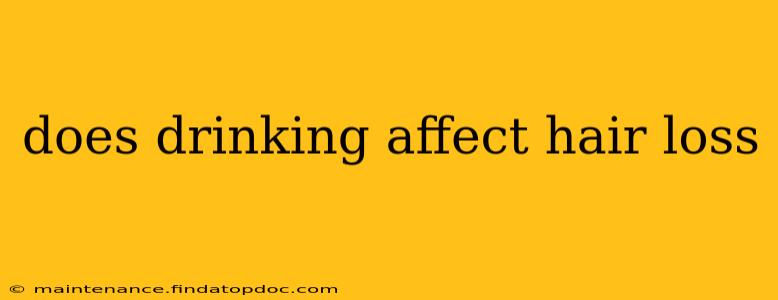Alcohol and hair loss: a topic that sparks a lot of conversation, fueled by anecdotal evidence and lingering questions. While there isn't a simple yes or no answer, the relationship is more nuanced than many realize. This article dives deep into the connection between alcohol consumption and hair loss, examining the mechanisms involved and addressing common concerns.
How Does Alcohol Impact Hair Growth?
The impact of alcohol on hair loss is multifaceted and not directly causal in the way, say, a genetic predisposition might be. Instead, it's more accurate to say alcohol contributes to hair loss through several indirect pathways.
-
Nutritional Deficiencies: Excessive alcohol consumption can interfere with the body's ability to absorb essential nutrients crucial for healthy hair growth, including vitamins (like B vitamins and vitamin D) and minerals (like zinc and iron). These deficiencies can weaken hair follicles, leading to thinning and shedding. Chronic alcohol abuse often results in poor diet choices, further exacerbating this issue.
-
Dehydration: Alcohol is a diuretic, meaning it increases urination and fluid loss. Dehydration stresses the body, potentially impacting hair follicle health and slowing down hair growth. Proper hydration is essential for maintaining optimal bodily functions, including hair growth.
-
Hormonal Imbalances: Excessive alcohol consumption can disrupt hormonal balance, potentially influencing the production of androgens, hormones linked to hair loss conditions like androgenetic alopecia (male and female pattern baldness). This hormonal disruption can contribute to increased hair shedding or miniaturization of hair follicles.
-
Inflammation: Chronic alcohol abuse is associated with increased inflammation throughout the body. This inflammation can negatively affect hair follicles, hindering their ability to produce healthy hair.
-
Liver Damage: The liver plays a critical role in metabolizing nutrients and detoxifying the body. Severe liver damage from long-term alcohol abuse can interfere with these processes, leading to various health problems, including hair loss.
Does Moderate Drinking Affect Hair Loss?
This is where things get tricky. While heavy drinking clearly increases the risk of hair loss, the effects of moderate alcohol consumption are less clear-cut. Some studies suggest that moderate drinking may not significantly affect hair growth in healthy individuals with a balanced diet. However, it's crucial to remember that "moderate" varies from person to person. If you notice any changes in your hair, it's always best to consult a dermatologist or healthcare professional.
Can I Regrow Hair Lost Due to Alcohol?
If hair loss is linked to alcohol consumption, addressing the underlying issue is crucial. Reducing or eliminating alcohol intake, adopting a healthy diet rich in essential nutrients, staying hydrated, and managing stress can all contribute to healthier hair growth. In some cases, hair may regrow naturally. However, significant hair loss may require medical intervention, such as medication or hair transplant procedures. A healthcare professional can assess your individual situation and recommend appropriate treatment options.
What are the signs of alcohol-related hair loss?
Alcohol-related hair loss often manifests as diffuse thinning, meaning hair loss is spread across the scalp rather than concentrated in specific areas. Other symptoms might include brittle, dry hair, or increased shedding. However, it's important to note that these symptoms can also be indicative of other hair loss conditions. A proper diagnosis is vital to determine the underlying cause.
How long does it take for hair to regrow after quitting drinking?
The time it takes for hair to regrow after quitting alcohol varies greatly depending on the severity of the damage, individual factors, and overall health. Some individuals may see improvements within months, while others may require longer periods. Maintaining a healthy lifestyle and addressing any nutritional deficiencies are key factors in promoting hair regrowth.
Is there a specific type of hair loss related to alcohol?
There isn't a single, specifically named type of hair loss directly caused by alcohol. However, alcohol can exacerbate existing conditions like telogen effluvium (a temporary shedding triggered by stress or illness) and androgenetic alopecia (pattern baldness). It can also contribute to overall hair thinning and poor hair quality.
In conclusion, while alcohol doesn't directly cause hair loss in the same way genetic factors do, it significantly contributes to hair problems through various indirect mechanisms. Moderation is key, and addressing underlying nutritional deficiencies and health issues is vital for maintaining healthy hair. If you're concerned about hair loss, consulting a healthcare professional is recommended for accurate diagnosis and personalized treatment.
